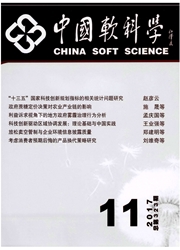

 中文摘要:
中文摘要:
目前,我国正处在传统农业向现代农业转型的关键阶段,既需要加大投入,更需要优化制度安排。基于农业生产力和生产关系相匹配的角度,将粮食产量这一显性可考察指标作为农业发展情况的综合评价,与不同阶段农业领域政策沿革结合起来动态分析。研究认为农业发展进程中有效激励约束非常重要,特别是资源禀赋条件决定我国难以自发成长为现代农业的情况下,通过明确激励约束理顺动力机制尤为关键。但目前老的激励约束机制渐渐失效、市场化新机制尚未发挥实质性作用,农业发展激励约束机制出现断档。深层次原因是我国农业发展的激励约束主要由政府从外部施加,内生发展动力不足,这导致出现行为短期化和责任外部化等趋势性隐忧,发展缺乏自发性和持续性。在现代农业建设过程中政府必须有所作为,但更要有限作为、有效作为,关键是激发农业内生发展动力。国家需梳理整合现有政策激励,深化改革构建市场化新激励,助力现代农业早日实现。
 英文摘要:
英文摘要:
Currently, China is in a critical stage of transforming traditional agriculture to modem agriculture. In this stage, the Government need not only to increase investment, but also to optimize policy arrangement. From the perspectives of agriculture productivity and production relations, this paper chose grain output as a measurable index of agriculture development, and conduct dynamic analysis in the course of agriculture policy evolution. Effective incentives and restraints are very important, especially in the case that our country's resource and environment endowment have restricted spontaneous growth to modem agriculture. But now the old incentive and restraint mechanism gradually becomes invalid, while market-oriented mechanism has not yet played a substantial role, our current incentive and restraint mechanism appears to be ineonsecutive. The reason is that existing agricultural incentives and restraints are mainly implemented by the Government and lacks of endogenous motivation. This situation leads to two negative trends: short-term-behaviors and external-responsibility. The Government should limit the direct involvement in it but form some effective support policies, and help rebuild the agricultural incentive and restraint mechanism to stimulate endogenous motivation. In order to reach the target, the Government should classify and integrate existing policy incentives, deepen agricultural reform to accelerate the construction of market-oriented incentive and restraint mechanism, and accelerate the realization of modern agriculture.
 同期刊论文项目
同期刊论文项目
 同项目期刊论文
同项目期刊论文
 期刊信息
期刊信息
